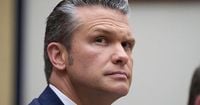Defense Secretary Pete Hegseth found himself at the center of a storm during a fiery congressional hearing on June 12, 2025, as he appeared to acknowledge that the Pentagon has contingency plans to take over Greenland and Panama by force if necessary. The hearing, marked by intense exchanges with Democratic members of the House Armed Services Committee, also saw Hegseth dodging questions about his use of Signal chats to discuss military operations, sparking fierce criticism and calls for his resignation.
Representative Adam Smith of Washington pressed Hegseth repeatedly, asking whether the Defense Department had plans to invade Greenland or Panama by force. Hegseth’s response was cautious but telling: "Our job at the Defense Department is to have plans for any contingency." When Smith followed up, asking if this included the possibility of invading Denmark—of which Greenland is an autonomous territory—Hegseth replied, "Any contingency you need, we've got it. We got a building full of planners, and we're prepared to give recommendations whenever needed." Smith shot back, "Speaking on behalf of the American people, I don't think the American people voted for President Trump because they were hoping we would invade Greenland."
The Pentagon’s routine practice of drafting contingency plans for various scenarios is well-known, but Hegseth’s ambiguous answers raised eyebrows and prompted Republican Representative Mike Turner of Ohio to intervene. Turner sought to clarify the record, stating, "You are not confirming in your testimony today that at the Pentagon, there are plans for invading or taking by force Greenland, correct? That is not your testimony today?" Hegseth responded, "All my testimony is, is that the Pentagon has plans for any number of contingencies." Turner emphasized, "Because I sure as hell hope that it is not your testimony." Hegseth concluded, "We look forward to working with Greenland to ensure that it is secured from any potential threats."
These revelations come amid President Donald Trump's repeated public statements about wanting to take control of Greenland, a strategic and mineral-rich island long allied with the United States. Trump told NBC News in March 2025, "We'll get Greenland. Yeah, 100%. There's a good possibility it could be done without military force," but added, "I don't take anything off the table." However, Greenland’s leaders have firmly rejected these overtures. Jacob Isbosethsen, Greenland's representative to the U.S., declared at a Washington forum sponsored by the Arctic Institute, "Greenland is not for sale."
Beyond the Greenland controversy, the hearing grew heated as lawmakers pressed Hegseth on a range of issues he had avoided in previous sessions. Representative Salud Carbajal of California, visibly frustrated, told Hegseth, "You're an embarrassment to this country. You're unfit to lead. You should just get the hell out." GOP lawmakers quickly apologized for the sharp rebuke, defending Hegseth against what they called "flagrant disrespect." Hegseth himself shrugged off the criticism, stating he was "happy to take the arrows" to make tough calls and do what’s best for the country.
One of the most contentious topics was Hegseth’s use of two Signal chats to discuss details of U.S. military operations against Houthi rebels in Yemen in March 2025. He shared information with U.S. leaders and even family members via the commercially available app, igniting concerns over whether classified information was improperly disclosed. Hegseth maintained that none of the information he posted—such as strike times and munitions used—was classified. However, Representative Seth Moulton, a Massachusetts Democrat and Marine veteran, challenged this, saying, "You can very well disclose whether or not it was classified." Hegseth dodged the question but defended the operation as "an incredible, successful mission." A Pentagon watchdog report on the Signal use is expected soon. When asked if he would hold himself accountable if the inspector general found he had shared classified information, Hegseth avoided a direct answer, stating only that he serves "at the pleasure of the president."
The hearing also touched on concerns about the politicization of the military. General Dan Caine, chairman of the Joint Chiefs of Staff, who appeared alongside Hegseth, was questioned about former President Trump's recent speech at Fort Bragg. During that event, members of the 82nd Airborne Division were directed to stand behind Trump, who made incendiary remarks, including attacks on his predecessor, Joe Biden. Troops were seen booing and cheering, and a pop-up MAGA merchandise stand sold souvenirs to soldiers in uniform. Caine emphasized that U.S. service members must remain apolitical but said he was unaware of specific incidents at Fort Bragg.
Hegseth also faced sharp questions on military policies regarding women and transgender service members. He asserted that he has worked to remove diversity programs and political correctness from the military, aiming instead for the "most capable troops." When Representative Chrissy Houlahan of Pennsylvania asked if men and women could perform combat roles equally, Hegseth replied, "It depends on the context," noting that women "carry equipment differently, a 155 round differently, a rucksack differently." He claimed that women have joined the military in record numbers under the Trump administration and insisted that military standards should be "high and equal." However, when asked about three female service members being forced out due to the Pentagon's ban on transgender troops, Hegseth acknowledged their accomplishments were to be celebrated—until he learned they were transgender. Republican lawmakers defended Hegseth, criticizing Pentagon spending on gender transition surgeries.
Meanwhile, Hegseth refused to commit to following federal court or Supreme Court rulings regarding the Pentagon’s deployment of thousands of National Guard members and hundreds of Marines into Los Angeles. Representative Ro Khanna of California pressed him on this during the same hearing. Hegseth said his job was to ensure troops in Los Angeles were capable of supporting law enforcement, adding, "We should not have local judges determining foreign policy or national security policy for the country." This stance echoed statements by Vice President Vance, who in February 2025 said on the social platform X that judges are not allowed to control the executive’s legitimate power. California has sued the Trump administration over the deployments, which followed Immigration and Customs Enforcement (ICE) workplace raids in heavily Hispanic neighborhoods, sparking protests. A federal judge declined to order immediate removal of the troops, pending further review. California Governor Gavin Newsom has engaged in a public war of words with President Trump and Hegseth, warning that such overreach could spread to other Democratic-run cities and states.
Khanna also questioned Hegseth about the U.S. military posture amid reports that Israel might launch an imminent attack on Iran. The defense secretary refused to commit to not striking Iran first unless Iran attacked the U.S., stating, "It wouldn’t be prudent for me to commit or not to commit. My job is to be postured and prepared." He added that President Trump is "giving Iran every opportunity, with talks ongoing," but fully recognizes the threat of a "nuclear blow up."
Throughout the grueling three-day congressional testimony, Defense Secretary Pete Hegseth was pressed on numerous fronts, from controversial military plans and deployments to sensitive operational security and the politicization of the armed forces. His responses, often evasive and at times provocative, have left lawmakers deeply divided and the public questioning the direction of U.S. defense policy in this turbulent era.





